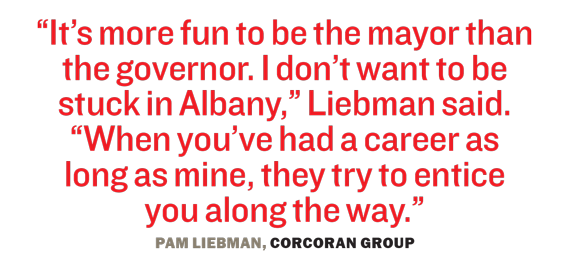Barbara Corcoran made her name with the sale of her eponymous firm for about $70 million in 2001.
As a 51-year-old former receptionist who started the firm with $1,000 gifted to her by an ex-boyfriend, Corcoran’s was the classic rags-to-riches story.
But behind the scenes, sources said Corcoran had little to do with negotiating the sale of the company to the Cendant Corporation, which is now NRT. Rather, it was Pam Liebman, who was hired by Corcoran back in 1984 as a 22-year-old kid fresh out of college.
Liebman, sources said, was the one who took the lead on hammering out the finer points of the transaction — and even finalized the $70 million price. And when Corcoran exited the company after the sale, Liebman was tapped to take the reins.
“Barbara would always say, ‘I want the last page of my book to say, I never even read a piece of paper,’” Liebman told The Real Deal in an interview at her Madison Avenue office last month. “She didn’t want to get involved in the details.”
Liebman, who is still on good terms with her former boss, has now been at the helm of the Corcoran Group for more than 15 years. And with several rough patches under her belt — most notably the 2008 financial crisis when NRT’s parent company, Realogy, came close to default and Corcoran shuttered several offices — her business acumen is being put to the test again. This time her two primary challenges are the intense competition for agents and the weakening luxury market.
But Liebman’s success — Corcoran has seen its annual sales skyrocket to $22 billion from $2 billion since it was sold — has some industry insiders speculating that she’s being eyed for a bigger role at Realogy, especially as NRT’s stock tumbles.
And in an interview last month, Realogy CEO Richard Smith — whose other brands include Coldwell Banker, Century 21 and Sotheby’s International Realty — did little to dispel that rumor.
“She’s capable of running something much larger,” he told TRD. “Someday, she could run NRT.”
Testing times
In the last couple of years, Liebman has emerged as something of a de facto leader in Manhattan’s residential world when it comes to going after rivals for aggressively poaching agents.
Corcoran was, for example, the first to sue the upstart firm Compass for pilfering its talent pool.
 The suit, which was filed in March 2015, claimed that the venture-backed firm had used “unlawful methods” by hiring several of Corcoran’s top agents and managers who had non-compete agreements in place. At the time, Compass had hired 51 agents from Corcoran. Liebman told TRD, however, that the firm’s Compass departures have now petered out.
The suit, which was filed in March 2015, claimed that the venture-backed firm had used “unlawful methods” by hiring several of Corcoran’s top agents and managers who had non-compete agreements in place. At the time, Compass had hired 51 agents from Corcoran. Liebman told TRD, however, that the firm’s Compass departures have now petered out.
Compass called the suit, which was eventually settled for undisclosed terms, “a misguided attempt by Corcoran to block independent contractors from choosing where to work.”
Douglas Elliman, Corcoran’s largest New York competitor, followed Corcoran’s lead, filing its own suit against Compass this fall. The suit alleged that Leonard Steinberg, a former top Elliman broker, who is now president of Compass, violated his non-compete by aggressively recruiting from his former firm.
Steinberg said he understood Liebman’s approach with her suit. “Business is business,” he said. “There are pretty sides, less pretty sides and ugly sides. One would hope you could avoid the ugly side, but Pam’s in a tricky position because she had to answer to a large corporation.”
For her part, Liebman said she won’t “sit idly by when we’re wronged.”
“All’s fair in love and war when you play within legal bounds,” Liebman said, referring to the Compass case. “When you go outside those bounds, you can be damn sure we’re going to take you down. We have zero tolerance for certain kinds of behaviors.”
Indeed Liebman’s aggressive stance against Compass — which has also gone after NRT’s agents in Florida and California — seems based on the cold, hard numbers.
Not only is Realogy’s stock dropping significantly (it was hovering around $24 a share last month, down from about $42 at the end of 2015), but the corporate real estate giant reported $1.21 billion in gross commission income for the third quarter, down from $1.25 billion in the same period last year.
Smith attributed that decline in large part to the poaching of top-level talent.
“This quarter’s performance in NRT is a combination of high-end softness in its major markets and the cumulative effect of competition towards top-producing sales associates,” he said during a third-quarter earnings call.
Smith noted that while the firm’s talent has always been a target for rivals, the trend has recently accelerated.

Barbara Corcoran
“[It] has recently become more pronounced as new entrants to the industry, as well as assorted established firms, use short-term economic incentives to build market share,” he said, referring to the high commission splits and signing bonuses.
During that same call, Smith announced that over the next 12 to 18 months, NRT will implement a plan for recruiting talent and retaining its existing agents.
He said that while the company will have to eat costs in the near term, it expects revenue increases to “more than offset” those costs.
Liebman seems a natural fit for the agent recruitment and retention efforts given the landscape she’s been dealing with in New York. And she’s already started taking an active role in NRT’s efforts. Last month, top producers from Coldwell Banker and other brands under the NRT umbrella -— who were in town for a companywide symposium — visited Liebman’s Manhattan office to talk about the national market and make New York connections.
On the agent retention front, Liebman and NRT have resisted offering agents the higher commission splits or signing bonuses that Compass has used to lure talent.
“I had an agent in today who’s being heavily recruited by another firm,” she told TRD last month, declining to provide specifics. “She said, ‘Pam, they’re throwing so much money at me.’ But we’re not big on the whole matching thing. It’s a zero-sum game. Agents have to want to be here. If you’re just buying someone, they’re not going to be
loyal.”
“I’ve been offered more money to go to other places, but I wouldn’t be happy there,” she continued. “What do you want? Do you just want money or do you want to be happy?”’
Liebman has steadfastly stood by that mantra, letting agents walk away — though some have returned after stints at rival brokerages. Top producers Robby Browne and Maria Pashby, for example, came back after jumping to Brown Harris Stevens.
Smith concurred. “People have left us to go after the shiny penny, and in short order the shiny-penny people are back because the representations that were made to them were not sincere,” he said. “I’m not saying they were dishonest, but they were not sincere.”
Smith called Liebman “disciplined” when it comes to sweetening broker compensation packages.
“If, from time to time, she needs to make an exception in the case of a broker, then she’s empowered to make those kinds of decisions, and she does it selectively,” he said.
In the cases where Liebman does actively go after an agent, she does so quietly.
In one instance, she said she met with a high-level broker at PDT, or Please Don’t Tell, a secret speakeasy on the Lower East Side. (The entrance is inside the restaurant Crif Dogs on St. Marks Place, where guests enter a phone booth and then make a call to get inside).
Liebman admitted that an expanded role at NRT was on the table, but she said she wasn’t rushing to accept.
 “It’s more fun to be the mayor than the governor. I don’t want to be stuck in Albany,” she said. “When you’ve had a career as long as mine, they try to entice you along the way.”
“It’s more fun to be the mayor than the governor. I don’t want to be stuck in Albany,” she said. “When you’ve had a career as long as mine, they try to entice you along the way.”
Others said it may not be smart for NRT to move Liebman up the ranks now.
“I would think they’d be afraid to take her out,” said Elliman CEO Dottie Herman. “When someone’s doing that well, it’s a big ‘if’ to take them out. She’s making more money for them there than anyone else.”
For her part, Barbara Corcoran guessed that her protégé might make a move if the salary were high enough.
“All of that can be overcome by the right price,” she said. “She just hasn’t heard the right price yet.”
Bottoms up
That knack for making money is not lost on NYC developers.
Liebman routinely fields calls from some of the industry’s most powerful players, asking her to weigh in on everything from unit mix to the overall market.
While Kelly Kennedy Mack leads the daily operations and oversees securing new projects, Liebman is said to get involved with many clients, including big fish like Vornado Realty Trust’s Steve Roth, whom she’s advised on sales at 220 Central Park South.
Calls from the likes of Roth and Extell Development’s Gary Barnett are the norm — not to mention Donald Trump, whom she’s known since her days working with Corcoran.
“He calls me Pammy, or My Pamela,” said Liebman, who declined to say if she voted for him.
When the construction crane at Barnett’s One57 snapped during Hurricane Sandy in 2012, he called just to check that she was safe at her home in Warren, N.J., she said.
“She knows everything about the real estate market,” Barnett said.
But Liebman wasn’t born into the business.
The daughter of a CPA and a special-education teacher, she was one of three silblings in a upper-middle-class family in the Sunset Hill neighborhood of Staten Island, where she attended Curtis High School.
“It was a great high school, very diverse. It had all ethnicities and groups in there,” she said, noting that she was class president. “It was the kind of school where certain people might have felt intimidated walking into certain bathrooms. There’d be a cloud of smoke coming out. But I got along with everyone, worked the system really well. I’m so not a pretentious person; I could travel in every circle.”
After graduating from the University of Massachusetts, Amherst with a degree in business and marketing, she quickly made her way into real estate.
In 1984, Liebman scored an interview with Corcoran through a mutual family friend. At the time, the firm was still in its infancy, with just over 30 agents. Corcoran herself was a rule-breaker, a master of promotion and the antithesis to the Chanel-clad Upper East Side brokers who controlled the luxury market.
 In the spunky 5’1” Liebman — who is known for her knack for impressions, her wicked sense of humor and her penchant for tailored leather jackets (she estimates that she owns 30) — she found a partner in crime.
In the spunky 5’1” Liebman — who is known for her knack for impressions, her wicked sense of humor and her penchant for tailored leather jackets (she estimates that she owns 30) — she found a partner in crime.
In a 2009 interview with TRD Corcoran recalled that Liebman “had a cool haircut.”
“She looked the part, she dressed the part, and she carried herself with great confidence,” Corcoran said. “I had 10 more senior brokers who were more experienced, and I was thinking, ‘How do I get them to let Pam be the boss?’”
Corcoran — who, of course, has gone on to TV and “Shark Tank” fame — found a way.
Liebman started at the firm as an agent, specializing in Downtown lofts, but moved up to management in 1986 when she took over the Downtown office. Later, in 1995, she pitched and built the firm’s new-development division, then known as Corcoran Marketing Group, creating an asset that now has more than $11 billion in exclusive new-development listings.
The duo made an entertaining pair.
They helped Corcoran to become the first major residential brokerage to put agent photos on their website in the 1990s, plaster their pictures on shopping bags and do photoshoots with their brokers wearing fur coats in Central Park.
“Corcoran was the new kid on the block,” Steinberg remembered. “And no one likes the new kid on the block.”
Liebman said Corcoran knew how to market and had creative ideas, but often turned to her to fill in the details.
“When we were in a meeting and it came down to the nitty gritty, bread-and-butter real estate things, it was me,” Liebman said. “If she had to talk to a reporter or something, she would say, ‘Pam, give me the numbers, tell me about the market.’ But she didn’t hide it, she joked about it.”
Corcoran backed up that characterization, saying she didn’t want to be saddled with bureaucracy, and considered herself a “master delegator.”
In 1990, Corcoran, concerned about losing her to a competitor, made Liebman a company partner and sealed her fate as the already obvious heir apparent.
Corcoran recalled introducing Liebman to the management team at NRT, noting that the high-level executives took an immediate shine to her.
“What happens with people who are very good politicians is that people at the top fall in love with them,” Corcoran said. “She really knows how to romance the stone. I knew that Pam would make the people at NRT very happy.”
Liebman said her boss also liked the fact that she got along well with “the guys,” adding that she’s still more comfortable going out for a beer or playing golf than attending a gala or gallery opening. “I have no patience for the ladies-who-lunch crowd. I get very antsy,” she said.
But Liebman’s ascent worried some agents.
“Pam was a baby when she came to Corcoran,” said Sharon Baum, a Corcoran agent who’s been at the company since 1991. “When Pam was tapped to head the company, it was like, ‘Wow.’ She was so young. All of us wondered, ‘Does she know anything about all these co-op boards I have to deal with?’”
“The way they looked, acted, dressed, everything was different,” Baum said of Corcoran and Liebman. “We were concerned. We didn’t know what we were in for.”
But Liebman earned her stripes with Corcoran’s old brass, developing a reputation as tough but fair.
“I don’t suffer fools well. I don’t have patience for laziness. I’ll always give people a fair shake, but I’ll stick to my guns when I think I’m right,” Liebman said.
Louise Sunshine — whose new-development marketing firm, the Sunshine Group, was purchased by Corcoran in 2002 for an undisclosed sum — was one of those who said they’ve felt Liebman’s rougher edge. Sunshine long claimed that she was booted from the company following the acquisition, Liebman said.
 Still, Sunshine said that despite their “ups and downs,” she’s always had a soft spot for Liebman.
Still, Sunshine said that despite their “ups and downs,” she’s always had a soft spot for Liebman.
“I don’t care what other people say,” she said. “I have a lot of respect for Pam. It’s not about nice. It’s about mutual respect, which is a whole lot better than nice. Nice is just a silly word.”
Current colleagues speak highly of Liebman as well.
Mack said the two often talk business on the phone late night — with Liebman drinking scotch and Mack drinking wine. And she described her in terms that suggest an outsized personality.
“She becomes completely obsessed with different restaurants,” said Mack. “It was Fred’s for a while, and then it was Avra. She’s a vegan. She’s always eating things that are very unappetizing-looking. Green things. With Pam, it’s lots of leather, lots of scotch and lots of veggies.”
Related Companies Chairman Stephen Ross, who hired Corcoran Sunshine, Corcoran’s new-development division, to work on the sale of the residential units at his Hudson Yards development, called Liebman a “very competitive little lady.”
“She likes to win,” he said. “She’s going to think of everything it takes to win.”
Shiny penny
In the face of increased competition and a softening market, Liebman now needs to tap into that temperament to keep the Corcoran brand fresh.
While Compass has dished out hefty compensation packages, Elliman has taken the lead on plowing funds into new marketing initiatives.
Its marketing department signed a multiyear sponsorship deal with Madison Square Garden for the right to slap its logo on an entire row of courtside seats, hosted exclusive invite-only dinner parties and launched a pair of glossy magazines.
While some of those initiatives have been scaled back in the wake of marketing guru Nicole Oge’s departure this year, the firm spent tens of millions of dollars to revamp its brand.
As part of a financially struggling, publicly traded company, Corcoran has resisted the pressure to match Elliman’s marketing muscle.
And when both Compass and Elliman ventured into Aspen and Los Angeles, Corcoran watched from the sidelines.
But Liebman said her decision not to go into those locations was motivated by data — not a fear of spending.
Indeed, she noted, the company is currently working on a multimillion-dollar office rehab across Manhattan.
It’s expanded its footprint with bigger offices in Soho, Chelsea and Williamsburg, and its Carnegie Hill office and 660 Madison Avenue flagship are also getting major facelifts. The company is also building a new agent education and technology center near Union Square. In addition, Corcoran Sunshine increased it footprint this fall at 888 Seventh Avenue.
“When we need to spend money, we do,” Liebman said. “We’re spending millions and millions of dollars when our leases are coming due to build new offices. And who else is getting Annie Leibovitz to shoot their marketing campaign?”
As for a jump to NRT, Liebman said it would be tough to entice her upstairs, for now.
“It’s not sexy enough for me. I’d be shocked if I left this post in the short term,” she said. “Unless something happened to Mike Pence,” she joked.
